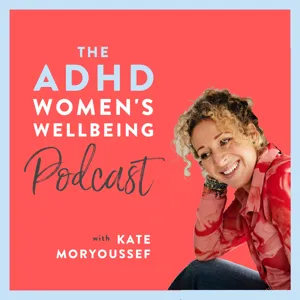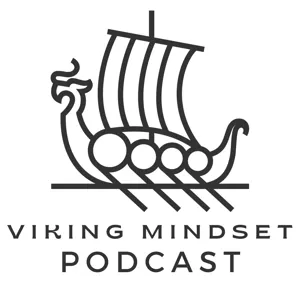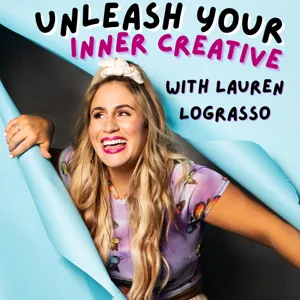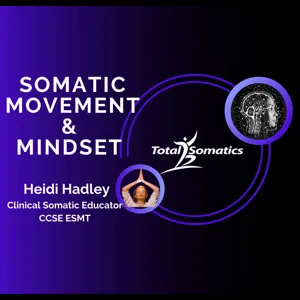Podcast Summary
Managing Nervous System Dysregulation for Women with ADHD: Learn signs of nervous system dysregulation, role of vagus nerve and polyvagal theory, and practical tools to feel calmer and balanced in a workshop for £33 on May 12th, plus join a membership for ongoing support and resources.
As women with ADHD, we often experience a lot of nervous system dysregulation, which can lead to burnout and exhaustion. To help manage this, Kate Moore Yousef, the host of the ADHD Women's Well-being podcast, is offering a workshop on managing the nervous system. During this workshop, she will discuss the signs of nervous system dysregulation, the role of the vagus nerve and polyvagal theory, and practical tools to help feel calmer, more grounded, and balanced. The workshop is on May 12th at 2 pm UK time for £33. Additionally, Kate is planning an ADHD Women's Well-being membership, which will include monthly live workshops, access to resources, and exclusive founding member pricing. This membership aims to help and serve more women with ADHD at a fraction of the cost of one-on-one coaching.
From Trauma to Inner Warrior: Angela Bentley's Journey: Angela Bentley, an ice warrior, overcame childhood trauma, low self-confidence, and unhealthy relationships to become a champion of the Wim Hof method and inspire women to unlock their inner warrior.
Angela Bentley, also known as the "ice warrior," shares her transformative journey from a life marked by childhood trauma and lack of confidence to becoming a champion of the Wim Hof method and helping women unlock their inner warrior. Before her ice-bath adventures, Angela's life was defined by her challenging childhood, low self-confidence, and unhealthy relationships. After having children and experiencing anxiety, she sought help and embarked on a journey of self-discovery. She learned that she had always been enough and that healing work is powerful but not necessary. Angela's life took a turning point when she met her husband, had kids, and faced anxiety after her second child. Despite being offered antidepressants, she chose to manage her anxiety through asking for help, eating healthier, and exercising. However, her life was disrupted when she suffered a ruptured ectopic pregnancy five years ago. Throughout her journey, Angela has discovered the power of believing in oneself and helping others do the same. Her mission is to share the Wim Hof method and inspire women to release their inner warrior.
From tragedy to transformation through personal growth: Facing challenges and allowing vulnerability can lead to profound personal growth and empowerment
Personal experiences, even those that seem devastating at first, can lead to profound growth and transformation. The speaker shares her story of surviving a ruptured ectopic pregnancy, which left her emotionally shattered but also unlocked deep-rooted issues from her past. After this life-threatening event, she found solace in cold water swimming and eventually trained in the Wim Hof method. This experience not only helped her heal emotionally but also led her to empower other women through safe and responsible cold water swimming sessions. The speaker's story illustrates the power of facing challenges head-on and allowing oneself to be vulnerable, ultimately leading to personal growth and empowerment.
Improve mental health with cold water immersion and breath work: Cold water immersion and breath work practices can reduce anxiety, increase inner strength, and improve mental health. The combination can lead to hormonal balance and increased resilience.
Cold water immersion and breath work practices, such as cold showers and Wim Hof's methods, can significantly improve mental health by reducing anxiety and increasing inner strength and resilience. These practices have been used for thousands of years and have been scientifically proven to work together. The breath work prepares the body and mind for the cold by activating the sympathetic nervous system, making the cold shock less intense. The speaker personally experienced the profound impact of these practices during the lockdown, which helped her cope with anxiety and stress. The combination of cold water immersion and breath work can lead to hormonal balance and increased strength, providing a powerful tool for insulating oneself from within.
Prepare mind and body for cold water with breath work: Breath work before cold water immersion warms intercostal muscles, improves blood flow, activates parasympathetic nervous system, and turns fearful situation into calming experience. Practice with community for added support.
Practicing breath work before entering cold water can significantly prepare both the body and mind for the experience. This breath work warms up the intercostal muscles and improves blood flow, while activating the parasympathetic nervous system and vagus nerve. By facing our fears of the cold and using breath work to control our bodies' natural response, we can turn a fearful situation into a calming and therapeutic experience. Additionally, engaging in this practice with a community of like-minded individuals adds an extra layer of connection and support.
Connecting with nature and breath work for emotional release: Practicing breath work and connecting with nature can provide deeper emotional release for women, offering an alternative to traditional social situations. This natural approach fosters joy, revitalization, and meaningful connections with oneself and others.
The practice of connecting with oneself through breath work and nature can provide a deeper sense of connection and emotional release for women, especially during challenging times. This method, which includes tuning in with one's body and feelings, offers an alternative to traditional social situations that may not resonate with everyone. By embracing this natural way of connecting, women can experience a sense of joy and revitalization, as well as a renewed appreciation for the importance of nature in our modern lives. This approach, which can be practiced alone or in a supportive community, allows individuals to prioritize their emotional well-being and foster meaningful connections with themselves and others.
The Power of Women's Support and Collaboration for Personal Growth: Women's retreats foster transformative experiences through collaboration and support. CBD oil from reputable brands like Columbia Care may help manage ADHD symptoms.
Women's support and collaboration are powerful tools for personal growth and emotional healing. This was highlighted in a discussion about a women's retreat, where women coming together and supporting each other was seen as a transformative experience. The speaker shared her own experience of feeling fulfilled and rejuvenated after attending such an event. Additionally, the speaker discussed her personal struggle with ADHD and how she has been using high-quality CBD oil to manage her symptoms. She emphasized the importance of using a reputable brand like Columbia Care to ensure the oil's quality and safety. Looking ahead, the speaker did not reveal specific plans but encouraged listeners to prioritize self-care and seek out supportive communities, whether through retreats or other means. She also encouraged listeners to explore the potential benefits of CBD oil for managing ADHD symptoms.
Incorporating small practices into daily life leads to significant benefits: Cold showers and breath work can boost health and courage to face fears, empowering individuals to tackle challenges and achieve goals.
Incorporating small, frequent practices like cold showers and breath work into daily life can lead to significant health benefits and increased courage to face fears in various aspects of life. Wim Hof, who practices what he preaches, shares his personal experiences of using these methods to overcome his own fears and grow his business. His ultimate goal is to empower others to realize they are enough and help them build the courage to take on challenges and achieve their goals. This can be done through a combination of cold exposure, breath work, and other practices, even in the absence of access to natural water sources. The vision is to create a center where people can connect with nature and themselves, fostering a sense of self-worth and the ability to tackle life's obstacles.
Incorporating Cold Water Immersion into Daily Routine: Cold water immersion boosts focus, attention, mood, and energy levels through the release of noradrenaline and dopamine, particularly beneficial for individuals with ADHD, and is an easily accessible, low-cost tool for combating procrastination and improving overall vitality.
Incorporating cold water immersion into your daily routine can have significant positive effects on both your physical and mental wellbeing. Whether it's a cold shower or a brief dip in a cold bath, the release of noradrenaline and dopamine can help increase focus, attention, and mood while reducing sickness and improving energy levels. These benefits are particularly important for individuals with ADHD, as noradrenaline deficiencies are often targeted with pharmacological treatments. Additionally, cold water immersion is an easily accessible, low-cost tool that can be incorporated into anyone's daily habits to help combat procrastination, improve mood, and boost overall vitality.
Exposure to cold water boosts dopamine levels: Regular cold water exposure increases dopamine, enhancing mood and mental health, especially for women during menopause
Regular exposure to cold water, specifically below 14 degrees Celsius, can significantly increase dopamine levels in the body, leading to feelings of excitement, joy, and euphoria. This surge of dopamine not only benefits the moment but also positively impacts mental health and everyday life. Additionally, for women going through menopause, cold water exposure can help balance hormones and alleviate symptoms such as anxiety, depression, and hormonal fluctuations. The benefits may take around 6 to 8 weeks to fully experience, and cold water can be used both as a prevention tool and a cure for stressful moments. It's a simple, cost-effective practice that can improve overall well-being and mood.
Managing ADHD symptoms with cold water immersion: Cold water immersion can help manage ADHD symptoms, provide mental clarity, and promote self-worth. A short dip can make a difference, regardless of age or diagnosis.
Cold water immersion, whether through a bath or a short dip, can be a simple yet effective technique for managing ADHD symptoms, especially for women. It's important to remember that everyone's journey is unique, and there's no need to compare yourself to others or set unrealistic goals. Even a short 30-second dip can make a difference, and the benefits go beyond just temperature regulation. Cold water immersion can help get you out of your head and into the present moment, providing a much-needed respite from the constant mental chatter and distractions of everyday life. It's a simple, accessible practice that can help you feel enough and remind you that you are worthy, no matter what your age or diagnosis may be. So, whether you have a bathtub or not, give it a try and see how it can positively impact your day.
Experience the calming effects of cold water immersion: Cold water immersion can provide a meditative experience, help individuals connect with their bodies, and promote personal growth through overcoming initial discomfort and fear.
Immersing oneself in cold water can provide a meditative experience and help individuals connect with their bodies and the natural world around them. This practice can help individuals focus on their breath and overcome initial feelings of panic or discomfort, ultimately leading to a sense of safety and accomplishment. By understanding what to expect during the experience and recognizing that the discomfort is temporary, individuals can overcome their fears and achieve personal growth. Angela, an ice swimming enthusiast, offers resources and retreats through her website, The Ice Warrior, to help individuals learn and implement this practice into their lives.
Join our Instagram community and leave a review to help spread the word: Listeners can engage with the podcast community, access free resources, and purchase workshops for personalized support in managing ADHD symptoms and improving well-being.
The speaker, Kate, expresses her gratitude for the support and engagement from listeners of her podcast about ADHD women's well-being. She encourages listeners to join the show's Instagram community and leave reviews to help spread the word. Kate also offers several free resources on her website for those interested in potential ADHD diagnosis, well-being improvement, emotional regulation, and post-diagnosis thriving. These resources include downloads, workshops, and coaching options. She mentions a "Suspect You Have ADHD" download, a well-being toolkit, a 3-minute calming technique, and workshops on using EFT for overwhelm and managing ADHD symptoms. The newest addition is a prerecorded workshop on thriving with ADHD after diagnosis, which is available for purchase. Kate aims to help listeners in various ways, whether it's through free resources or personalized coaching.






